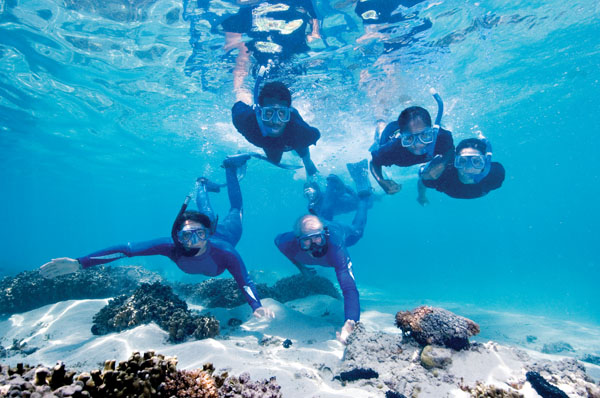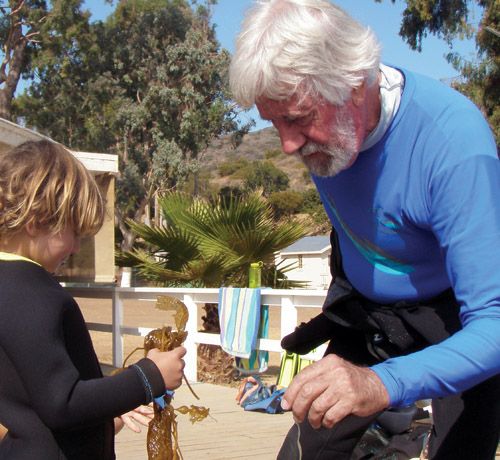Living Classrooms in the Undersea World
ByJean-Michel Cousteau

Amid laughter and squeals of delight, twenty families splash into the chilly waters off Catalina Island, California. It certainly doesn’t look like serious education, but it is. These are students with their parents from all over the country, many of them diving into 68°F (20°C) ocean water for the very first time, participating in the annual Jean-Michel Cousteau Family Camp at Howlands Landing. I watch as each of them enjoys an intimate connection with the rich diversity of life found in the giant kelp forests of southern California. Here nature teaches by example, offering living lessons in a classroom of the sea. I am not a teacher but a guide, sharing my passion of our interdependence on a healthy, thriving marine ecosystem; letting the families share in this bonding experience as they take a peak into the undersea realm that covers over 70 percent of our water planet. It is experiences like this that gives me the greatest hope of helping prepare the next generation to become stewards of the planet they will inherit.
The oceans of our blue planet provide so much to us —70 percent of our life-sustaining oxygen, protein as a major source of food, life-saving compounds used in medicines and life-giving rains that form as a result of the interaction between the ocean and the atmosphere. And we have yet to scratch more than the surface of the sea. Experts estimate that we have explored less than 10 percent of the ocean. It is these children, with their parents’ support, who will make critical decisions as adults that will better protect our fragile world.
Along with my late father, Jacques Cousteau, I have spent my life exploring the ocean. Since first being thrown overboard by my father at the age of 7, I have been compelled to explore, to discover, to understand the secrets of the sea. An oft-quoted fact is that we know more about the surface of the moon than we do about our own planet. Since the vast majority of the surface of our planet lies beneath the sea, we must inspire family and friends to feel compelled to dive beneath its surface as divers like us; or at least realize that every two out of three breaths comes from phytoplankton in the sea. We are all connected to the sea.
Because of this need to help our society become more ocean literate I have devoted much of my time and energy working with my talented team to develop marine educational programs through Ocean Futures Society. These include our annual Family Camp and twelve different Ambassadors of the Environment programs operating around the world. Conducting hands-on, inquiry based and really fun outdoor education programs focused on ocean ecology and sustainability, I’ve witnessed first hand that it’s people with a solid understanding of how the ocean works who then better understand how it connects to their lives. In order to sustainably manage our ocean resources, we need an informed public that understands the value of the sea and is willing to support responsible governance and ocean ethics.
Over-exploitation of fish and shellfish, pollution, the loss of species and habitats, and mismanagement of on-land resources are undermining the ability of the sea to continue to provide these goods and services. I believe people, particularly young people, who understand fundamental connections among ecological systems and principles, are essential to protect and manage these ocean resources wisely. We need to show that everything is connected, all components of the biosphere: land to the sea, the ocean to people, people to people and the present to the future. These connections should be both intellectual and emotional – the head and the heart. I mention the heart because, ultimately, it’s our emotions that usually drive our decisions.
We’re all aware that we’re in an age of information overload. We have enough research on most ecological topics to make sound, common sense decisions that are pretty much on target to protect the ocean and ourselves. But we don’t act on this information. Why? I believe it’s because we’re not emotionally inspired and that’s because more and more children are becoming disconnected from nature. My team and I have struggled with this for the past 30 years and here’s what we do: we take people to sea. Plain and simple, we get kids wet! The tide is now rising, and with it comes a whole new set of stories for the students, waiting with masks and snorkels in hand.
As a society, we need exactly that – to turn again to the ocean and its profound principles of life to inspire a new generation of youngsters who better understand how the world works, who will know that the sea runs in their veins and who will love and protect it.
For the past 14 years, every August, I’ve enjoyed this unique family experience on Catalina. It’s rewarding for us all to see parents and kids sharing dives, meals, hikes and having fun amid all the natural wonders of Howlands Landing on the island, without the electronic games, telephones and other distractions that separate us from each other and from the beautiful natural environment. That spirit of family engagement and sharing is what keeps us, the staff, going each year. It’s inspiration and a reminder that this next generation is getting love and support and an understanding that we all live on a water planet where everything is connected.
And every year I have the same sense of hope as we return to the mainland together on the Catalina Express boat because among all the adventures enjoyed by the kids are magical moments that will stay with them forever. And it’s those special moments in nature that touch the heart and influence the decisions and direction a person takes in their life.
We applaud the parents who care and take time from their busy lives to give their kids some of the best experiences they’ll ever have, bonding the family and connecting it with the natural wonders of this magnificent planet we call home.
Leave a Comment








